Euro-Integration
“Lavoriamo tutti per partecipare alla festa”. Damian Zalewski è l’immagine vivente della Polonia post integrazione europea. Studi universitari di alto livello a Nancy in Francia, poi impiego di prestigio al Comune di Poznan, prima del futuro sicuro salto a Bruxelles.
Il Paese slavo ha reclutato tutte le sue migliori forze per Euro 2012. La competizione continentale di calcio non è solo un evento sportivo di prima importanza ma soprattutto una vetrina per mostrare al mondo il volto nuovo della Polonia. Insomma, un’occasione unica da non fallire assolutamente.
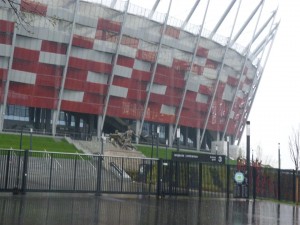
Stadio Nazionale – EuropaRussia
I precedenti sono incoraggianti: la Spagna sfruttò in modo eccezionale il volano rappresentato dal Mundial del 1982 per lanciarsi come mèta del turismo di massa e dimostrare alla comunità internazionale che le dolorose pagine, legate al franchismo, erano ormai superate.
Gli scettici – che, come al solito, non mancano mai – puntano, invece, il dito sui costi. In Germania nel 2006 ed in Sud Africa nel 2010 le perdite finanziarie sono state considerevoli. Per fortuna, finora nessuno scomoda il caso delle Olimpiadi greche, peccato originale del default ellenico.
A dire il vero, il potere delle televisioni e degli sponsor impedisce oggi esodi biblici di massa al seguito delle squadre nazionali come in passato, favorendo, però, la mondializzazione dell’evento sportivo ed un quarto d’ora di celebrità alle località ospitanti.
Ma attenzione. L’europeo polacco – ucraino va inquadrato in un’ottica diametralmente diversa rispetto alle competizioni passate. E comunque andrà sarà un successo. La ragione reale della sorprendente scelta dell’Uefa a Cardiff nel 2007 delle due sedi dell’Europeo è difatti di carattere politico e supera enormemente le pur valide motivazioni sportive.
Dopo il Duemila la comunità internazionale ha preso tra le sue braccia la Polonia, poi di riflesso l’Ucraina. Nel bilancio Ue 2007-2013 a Varsavia sono andati 67 miliardi di euro, fondi continentali, da spendere principalmente in infrastrutture. Nel prossimo settennato ne verranno concessi, secondo anticipazioni, 81. L’obiettivo centrale è di ammodernare il sesto Paese più popoloso dell’Ue e di farne una futura colonna portante dell’Unione.
Viaggiare tra le sedi della manifestazione calcistica è il vero problema dei tifosi. Poche sono le autostrade – molte ancora in costruzione -, i treni lasciano a desiderare, i voli low cost interni – di recente inaugurati – sono un grosso punto interrogativo.
Facciamo il caso della squadra azzurra, che ha la sua base nella bellissima Cracovia, la città di Karol Wojtyla, nel sud del Paese. La prima partita contro la Spagna a Danzica sul Baltico e le altre due a Poznan, ad un passo dalla frontiera con la Germania. Cracovia – Danzica in treno sono più di 10 ore di viaggio, 12 in auto; Cracovia – Poznan in ferrovia circa 6 ore, grosso modo lo stesso in macchina.
Lasciamo perdere l’Ucraina, dove le distanze sono molto più grandi. Se dopo la prima fase a gironi qualcuno fosse costretto a spostarsi da Poznan a Donetsk (la città più ad ovest di Euro 2012 e quella più ad est – ossia il caso dell’Italia se dovesse arrivare seconda nel suo girone eliminatorio dopo la favoritissima Spagna) dovrebbe percorrere ben 1900 chilometri.
Dei biglietti, da mesi, non c’è manco l’ombra. “Al lavoro ho partecipato ad una specie di lotteria – ci racconta Ela, dipendente di un ministero –. Alcuni tagliandi erano stati messi in palio. Nulla!” Gli stadi sono troppo piccoli per rispondere alla richiesta dei polacchi. Gli sponsor della manifestazione hanno poi fatto la parte del leone. Il rischio di rimanere fuori dallo stadio, se non si ha qualche santo in Paradiso, è alto. Conclusione: questi sono Europei soprattutto televisivi e virtuali.
Ma anche tecnologici. Nei centri cittadini di tutte e quattro le sedi polacche di Euro 2012 – ossia Varsavia, Danzica, Poznan e Wroclaw (ossia Breslavia) – il servizio gratis di Wi-Fi funziona per 24 ore al giorno. Chiunque con un portatile o con un telefono cellulare di ultima generazione può collegarsi ad Internet.
Uno dei pochi aspetti, che decisamente non va, è legato ai bancomat. Tutte le banche – polacche ed internazionali – applicano automaticamente tassi di cambio assai inferiori rispetto ai normali cambiavalute o alla Banca centrale polacca. Di solito 1 euro per 3,7 zloty o 3,8 rispetto a 1 per 4,1 o 4,2. E meno male che si spinge la gente a non usare il contante!
Christian Forstner, “l’immagine della Germania in Europa non si è indebolita per lo scandalo Wulff”.
26 Feb 2012 “Le dimissioni sono state un atto di responsabilità”. Questo il commento del noto politologo Christian Forstner a conclusione dallo scandalo che ha coinvolto la Presidenza federale tedesca.
“Chiariamo subito – dice il direttore della sede di Bruxelles della fondazione Hanns Seidel, vicina ai potentissimi cristiano-sociali bavaresi, – che Wulff ha lasciato l’incarico per ciò che aveva fatto prima di diventare presidente e non per aver commesso un qualcosa durante il suo mandato. La sua vera colpa è che in passato era stato troppo vicino agli uomini d’affari”. 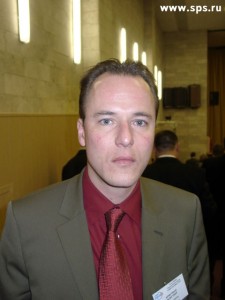
Ma da capo dello Stato Wulff ha tentato di bloccare la pubblicazione di alcuni articoli compromettenti. “Certo. Con la sua uscita di scena Wulff ha voluto difendere l’istituzione della Presidenza federale. La giustizia sta aprendo un’inchiesta penale”. Le sue dimissioni sono state un colpo alla cancelliera Merkel? “Da un certo punto di vista sì. E’ stata lei a proporlo alla carica di presidente. Ma la decisione di Wulff di farsi da parte le riconsegna spazio di manovra”. Prima Horst Koehler poi Christian Wulff, ambedue andatisene anticipatamente. Se possiamo dirlo, senza che qualcuno si offenda, la Merkel non è proprio fortunata con i candidati che sponsorizza. “Sì, ma attenzione. Il presidente federale in Germania è poco più che una figura simbolica. Ha una funzione di mera rappresentanza. Ad esempio, adesso durante la crisi dell’euro è stato il governo, nella persona della cancelliera, ad avere il potere di decisione. Non la Presidenza federale”.
Ecco analizziamo le dimissioni di Wulff da una prospettiva europea. Dal punto di vista dell’immagine la Germania non ne esce un granché bene. Ricordiamo che mai nella storia un suo presidente si era dimesso per lo scoppio di uno scandalo. “Non vedo alcun indebolimento del mio Paese a livello continentale. Ripeto il presidente da noi ricopre una carica simbolica. Se viene a Bruxelles va a trovare il re del Belgio e non va a trattare alla Commissione europea. L’estate scorsa Wulff aveva criticato in un discorso la Banca europea, quando questa aveva iniziato a comprare le obbligazioni dei Paesi in difficoltà tra i quali l’Italia. Malgrado le critiche in Patria non v’è stata quasi traccia delle sue parole all’estero. Se quelle stesse cose le avesse dette il suo predecessore l’economista Koehler, che era stato capo del Fondo monetario internazionale, la sua influenza sarebbe stata mediaticamente maggiore, ma nulla più. In questi mesi le decisioni europee vengono prese a livello di capi di governo. Persino i ministri hanno visto ridimensionato il loro ruolo”.
In conclusione, esiste in Germania una concezione di moralità nella politica diversa che in Italia o nel resto d’Europa. E se sì, perché? “Gli scandali ci sono anche da noi, soprattutto a livello regionale. La differenza viene fatta dall’opinione pubblica che mette fine alla carriera dei politici chiacchierati”.
Latvia. “No” in the Russian language referendum.
20 Feb 2012“On Saturday, citizens were called to vote in a referendum to decide whether Russian should be made the country’s second official language and be given equal status with Latvian. The result was clear: 78 percent voted against the proposal, 21 percent in favor. Some 69 percent of the 1.5 million eligible to vote cast their ballot. 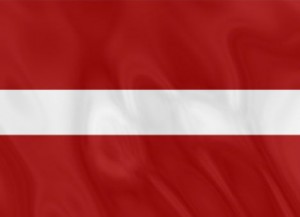
The referendum was launched by the initiative Mother Tongue of the Russian minority in the country and intended to change five clauses in the country’s constitution.
“The Russian people of Latvia have to show to the rest of the world that they will never accept their status of being outcasts in their own home country,” the website of Mother Tongue urged its supporters ahead of the poll.
The government, however, had called on people to vote against the proposal, arguing that the Latvian language was at the heart of the constitution and that the proposal had to be defended…
The referendum marked the escalation of tensions that had been simmering for decades. Under Soviet rule, hundreds of thousands from across the Soviet Union where moved to Latvia to work there. Moscow’s policy eventually led to over 40 percent of Latvia’s population officially speaking Russian as their first language. Many Latvians saw Russian as a threat to their own language and were concerned at the prospect of becoming a minority in their own country…
Citizenship also depends on knowing Latvian. As a consequence, some 300,000 people living in the country are stateless. They do not hold Latvian citizenship and only have their old Soviet Union documents and passports. Amongst other disadvantages, those 300,000 don’t have the right to vote…
The main problem is not the language, but rather the general view that Latvians have on the Russians. Many Russians are discriminated against because of their ethnicity and are treated like second-class citizens, she said, adding that she herself is not too optimistic that this will change anytime soon… ”
Full Article – Deutsche Welle
«На любой широте земного шара, когда общество переживает экономический, социальный и моральный кризис, неизменно поднимается волна расизма и ксенофобии. Россия, увы, не исключение… в ДНК России теоретически должны присутствовать антивирусы против расизма и ксенофобии… Расизм и ксенофобия — симптомы более тяжелых болезней…
43% респондентов опроса «Левада-Центра» поддерживают лозунг «Россия для русских». … 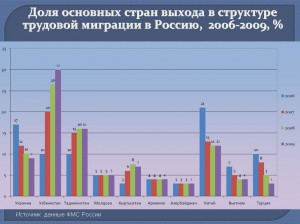
они просто боятся потерять свои привилегии (наверняка экономические) и свою идентичность…
Недавно я с удивлением прочитал о предложениях по ужесточению миграционной политики в России. Общее распространенное мнение и оправдание этого таково: мы не хотим закончить, как Европа, мы защищаем нашу специфическую идентичность. Пожалуйста, нет проблем, каждый у себя дома хозяин. Однако вам только кажется, что орды варваров напали на Старый континент, как некогда гунны на беззащитную Римскую империю. Это совсем не так.
Я мог бы спросить у ваших политиков, что они думают о европейской «Программе Стокгольма», но не стану этого делать, потому что уверен: 99% из них просто ничего о ней не знают. Хотя за последние два года этот документ стал фундаментальным для всех членов ЕС в вопросах миграции, интеграции иностранцев, борьбы с ксенофобией и национализмом. Причина проста: … возникла необходимость выработать общий подход и установить единые правовые рамки. Короче говоря, в Европе эпоха чрезвычайных ситуаций с миграционными потоками закончилась.
Стратегическая цель «Программы Стокгольма» — построение открытой, безопасной Европы. Среди прочих важных моментов в эту программу заложены: упрощение легализации нелегалов, чтобы они не попадали в сети криминалитета; солидарность стран — членов ЕС в деле интеграции мигрантов; подписание договоров с третьими странами (теми, откуда эти люди приехали). Этот документ сейчас — часть внешней политики ЕС.
Вы спросите: а что-то изменилось на практике? Многое. Мигрантов вытаскивают из нелегальности…
Если Европа стареет, то уж Россия по сравнению с ней — просто исчезает. Вот данные, представленные в исследовании ООН. В 2011 году ваша страна имела 88,6 миллиона трудоспособных граждан, к 2025 году их будет 77,1 миллиона. При столь драматическом демографическом кризисе до 2050 года Россия будет нуждаться в 24,9 миллиона людей, чтобы просто сохранить нынешнее количество жителей, и в 35,8 миллиона мигрантов, чтобы сохранить сегодняшнюю производительную мощь.
Мигранты решают в России те задачи, которые ее коренные жители давно уже не хотят решать…
Для нормально функционирующего государства между иностранными и местными работниками нет никакой разницы. Главное, чтобы все работали легально при цивилизованных законах и платили налоги. На Западе уже давно не скрывают от своих граждан тот факт, что без денег, поступающих в бюджет в качестве налогов от мигрантов, невозможно будет сохранить текущую пенсионную систему. А в России кто-то уже забыл, в какой ситуации находится ваша пенсионная система? Ну, тогда вам скоро напомнят — к примеру, повышением пенсионного возраста или другими непопулярными мерами…
У меня нет никаких просьб к политикам. Но есть одна просьба к вам, уважаемые читатели: не верьте сказкам, рассказанным во время предвыборной кампании. И имейте в виду, что после выборов, когда праздник закончится, вам непременно выставят счет.
Статья – Джузеппе Д’Амато Московский Комсомолец № 25856 от 31 января 2012 г. Giuseppe D’Amato Moskovskij Komsomolets.
Angela Merkel, “We must be more European.”
26 Jan 2012 “In her keynote address, opening the World Economic Forum in Davos, Chancellor Angela Merkel urged Europe to become “more European” and work together to resolve its festering problems. 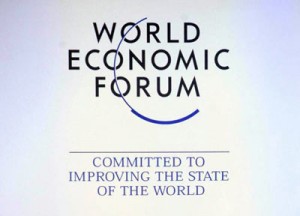
Merkel said Europe lacked the political structures to make the common currency, the euro, work properly. Despite recent biting criticism that Germany should shoulder more responsibility in the current debt crisis, Merkel stressed that Berlin was resolved to do what was necessary to save European unity.
Merkel said that the world had not learned from the 2008 financial crisis. Reforms of financial markets have not gone far enough, she said.
The Chancellor said Berlin was ready to play its full part in combating the eurozone crisis, but could not promise things it cannot deliver.
In an interview Merkel insisted that nations at the center of the eurozone debt crisis needed to press ahead with economic reform measures. “It does not make sense to promise more money, but not tackle the causes of the problem,” the Chancellor said.
At the same time, she again called on other European leaders to agree on a tough set of parameters to form the basis of the planned fiscal pact on budget discipline.
“If you have promised debt reduction and solid public finances a hundred times, then it must also be enforced in the future,” Merkel said.
The Chancellor’s remarks followed calls by Italy and the International Monetary Fund for Germany to offer more funds to boost the so-called European Stability Mechanism (ESM). Merkel has ruled out bolstering the permanent euro rescue fund… ”
Full Article – Nancy Isenson Deutsche Welle
Former German Foreign Minister Hans-Dietrich Genscher has paid tribute to the late Czech president and anti-communist hero Vaclav Havel. Europe has lost a “great European,” Genscher says. When did you last speak to Vaclav Havel? 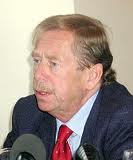
Hans-Dietrich Genscher: It was either this year or last year. We saw quite a lot of each other – even before the revolution in 1989 – but of course much more during his time in office. But we also still kept in touch after we both had left office. I had direct a contact with him for many years through two of his colleagues who worked on “Charter 77” with him.
When you first met Havel, he had already been a writer for many years. In that sense he was not a professional politician, but an artist. What role did that play in his commitment to politics?
Commitment to freedom was a way of life for him. But as a poet he was able to convey his beliefs through the power of words. And it was with the power of words that he challenged the communist regime in former Czechoslovakia and ultimately brought it to an end. He was a source of encouragement to the people of the Czech Republic and Slovakia in their fight for freedom and democracy.
Thinking back to the revolution in 1989, the image that comes to mind for many people is of Havel on the balcony of the embassy in Prague. Which image of Vaclav Havel has particularly stuck in your memory?
A whole series of images come to mind, even those taken when you could see how distressed and restricted he was by his terrible disease. And yet you could still see his fighting spirit and the courage he had shown during times of persecution. The former federal German President Richard von Weizsäcker’s first visit to the official residence of the Czech president in Prague was also particularly special because the man who was formerly persecuted could receive guests from Germany as the president of Czechoslovakia.
People often refer to a “political friendship” when the talk about the relationship the two of you shared. You have said yourself that you continued to see Havel even after your political career had ended. Was it a political friendship or was it more than that?
We were certainly in tune with one another on many basic issues, but there was also a very human affection, which probably should always be the case. It was the case here. Perhaps the fact that we had both experienced life under communist regimes played a part. He experienced it in Prague and I had experienced communism while living in the Soviet occupation zone and then the German Democratic Republic between 1945 and 1952, before I left for West Germany.
What will you miss most about Vaclav Havel?
The death of Vaclav Havel has made Europe a lot poorer. We have lost a great European and I think that many Europeans will be united in mourning today, at any rate, the Germans and the Czechs.
FULL Interview – Michael Borgers – Deutsche Welle
VIDEO – Mourning
BIOGRAPHY – France24 – VIDEO
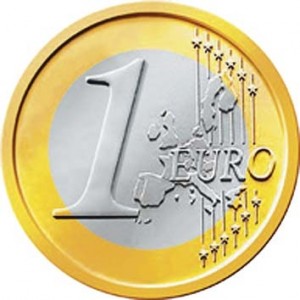 Due sono le cose: o gli europei che vivono nell’area dell’euro sono su un “Titanic” e non se ne accorgono oppure chi è al di fuori della zona della moneta unica è in preda ad un isterismo strisciante. Gli unici aspetti certi sono che il lontanissimo rischio che la situazione finanziaria continentale possa degenerare ha preso forma e i Diciassette dell’euro hanno la necessità di dover assumere con rapidità decisioni strategiche di portata epocale.
Due sono le cose: o gli europei che vivono nell’area dell’euro sono su un “Titanic” e non se ne accorgono oppure chi è al di fuori della zona della moneta unica è in preda ad un isterismo strisciante. Gli unici aspetti certi sono che il lontanissimo rischio che la situazione finanziaria continentale possa degenerare ha preso forma e i Diciassette dell’euro hanno la necessità di dover assumere con rapidità decisioni strategiche di portata epocale.
Per meglio comprendere cosa stia accadendo, tralasciando analisi di carattere economico e monetario, è opportuno soffermarsi su due momenti fondamentali: quello politico e quello culturale.
Il primo punto da evidenziare è che la costruzione europea, sorta dopo la fine della Guerra Fredda, è entrata immancabilmente in crisi in questi tesissimi mesi. Adesso i Diciassette hanno il difficile compito di edificare, in tutta fretta, l’Europa del Ventunesimo secolo, quella che – tutti noi ci auguriamo – competerà in futuro nel mondo globalizzato con altri giganti regionali.
E’ bene subito segnalare che non bisogna inventare nulla. Si sa bene quali passi compiere e quali soluzioni scegliere. Il problema è un altro: far approvare questo complesso piano di riorganizzazione da tutti i membri e metterlo in pratica in men che non si dica. In buona sostanza, se si vorrà far sopravvivere l’euro gli Stati nazionali saranno costretti a cedere – a vantaggio delle istituzioni comunitarie – ulteriori quote di sovranità, dopo quella monetaria alla Banca centrale europea nel 2002.
Il processo di unione politica, che ha segnato un passo falso con la bocciatura della Costituzione continentale (poi rimediato parzialmente con la successiva “mini -Costituzione”), è destinato a ripartire con veemenza e giocare ora un ruolo centrale. Il dubbio è se i singoli Stati dell’area euro sono pronti a questo sacrificio. Le resistenze saranno assai forti, ma l’Europa sta pericolosamente avvicinandosi ad un precipizio.
Se salta il banco tutti indistintamente ci rimetteranno e non poco. Secondo il presidente della Commissione Barroso ogni singolo Paese perderebbe il 50% del suo Pil. Come riferiscono alcuni specialisti il marco di apprezzerebbe del 40% il giorno stesso della sua riapparizione e la lira segnerebbe un meno 60%. In questo modo gran parte dell’export tedesco perderebbe competitività con spaventose ripercussioni interne. La Germania si ritroverebbe una “Cina” supertecnologica (leggasi Italia) in mezzo al Vecchio Continente, come avvenne tra il 1994 ed il 1995, quando una bottiglia di vino italiano costava nei supermercati tedeschi meno di mezzo litro di birra bavarese.
L’Europa si appresta ad affrontare contemporaneamente anche una rivoluzione culturale. Come si ricorderà la nascita dell’euro ha rappresentato il compromesso perfetto tra la Germania, che rinunciava al marco, ed il resto dei membri Ue, che temevano per la riunione tedesca. Ci volle un decennio per far quadrare il cerchio e partire con la moneta unica, che è stato soprattutto un evento politico. Dal 2002 la Bce, con sede giustamente a Francoforte, ha seguito fedelmente linee guida simili a quelle che avevano ispirato l’azione della Banca centrale tedesca per tutto il dopoguerra. Ossia lotta all’inflazione e moneta forte. Gli incubi iperinflattivi dei tempi della repubblica di Weimar rimangono ben presenti nei tedeschi di oggi. Ma ora quel tipo di scelta assai rigido non sembra più rispondere alle esigenze dei tempi.
Se si vogliono “fare gli europei” i tedeschi dovranno per necessità diventare più flessibili, mentre gli italiani più quadrati (maggiormente rispettosi delle leggi) e i francesi meno arroganti. Altrimenti il rischio è che ognuno vada per conto suo e subisca in futuro la globalizzazione dei colossi asiatici ed americani.
Giuseppe D’Amato
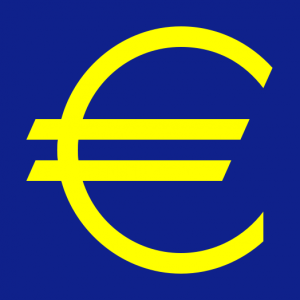 «…«Смотрю целыми днями иностранные телеканалы. Много чего непонятно»,- исповедуется мне московский эксперт по энергетике… Поставлю себе сложную цель – великим и могучим русским языком описать путанную ситуацию…
«…«Смотрю целыми днями иностранные телеканалы. Много чего непонятно»,- исповедуется мне московский эксперт по энергетике… Поставлю себе сложную цель – великим и могучим русским языком описать путанную ситуацию…
Проект единой валюты родился с падением Берлинской стены как компромисс. Европейцы убрали все препятствия для немецкого воссоединения, а Германия отказалась от марки. 17 из 27 государств-членов ЕС создали еврозону, отказались от части своего суверенитета и делегировали стратегические финансовые функции ЦБ во Франкфурте и Еврогруппе (собранию 17 министров экономики стран-членов зоны евро).
А что происходит у нас сейчас? Ответ прост: строится Европа XXI века. Наверное, в странах, где царит вертикальная власть, этот момент не совсем понятен. У нас нет правящего государя, а есть лидеры, которые стараются договориться и найти удобный всем компромисс. Это очень трудное дело, особенно во время кризиса, когда необходимо спешить. Европейские лидеры на уровне сообщества знают, какие меры (непопулярные) нужно применять, но тормозят из-за внутренних национальных расчетов.
Но деваться некуда. Государствам еврозоны придется скоро отдать еще часть своего суверенитета Евросоюзу. Первые экономические шаги: единая налоговая политика, еврооблигации и политическое разделение новых долгов…
Европейский кризис, который, видимо, будет длиться долго, состоит из трех разных взаимосвязанных точек и разыгрывается на двух полях (то есть на континентальном и национальном уровнях). Общая цель ЕС – не спровоцировать «эффект домино», а цель каждого члена – заплатить поменьше…
Из-за европейских событий внимание к настоящему больному, то есть к США, где начался мировой кризис, снизилось. И, наверное, это к лучшему. Ведь рассуждая об этих вещах, важно смотреть на цифры, чтобы понять вес стран в мировой экономике. ВВП Европы – 16,2 триллионов долларов, США – 14,6, Италии – 2,1, стран БРИКС – 11,3 (правда, без Китая только 5,4, то есть примерно как ВВП Японии), Греции – около 330 миллиардов. Экономика России, у которой есть опасные структурные недостатки в виде зависимости от экспорта энергоресурсов, сравнима с экономикой штата Техас. Шесть стран Большой Семерки вместе взятые еле-еле обгоняют ВВП США. А там скоро выборы, и курс евро-доллар пока будет стабилен, иначе Америке грозит массовое закрытие производств…
Но вернемся к России, для которой этот кризис представляется большим риском, несмотря на солидные валютные резервы. Можно задать один вопрос, на который пока никто официально не ответил: почему идет столь масштабное бегство капитала из страны, что подтверждает Банк России? Ответа на него я давать не буду, предположу лишь, что первыми, кто не уверены в будущем своей страны, являются сами россияне.
Далее. Если России не хочется играть в пользу Китая (вам не достаточно истории с ценой газа для Пекина?), то вашим властям не надо вводить людей в заблуждение. Рецепт исцеления мировой экономики — вовсе не в БРИКСе, который скоро начнет страдать от затяжных невысоких темпов роста Европы и США и, не дай Бог, от рецессии. Во всяком случае, это очень похоже на идею лечить аспирином сломанную шею.
Нет, понадобятся согласованные общемировые решения. Такие, например, как ограничение возможностей для спекуляции, которая способна разрушить экономики здоровых государств, и наведения порядка в отношениях с Пекином. Но в Каннах, на Большой двадцатке, об этом почему-то не говорили.
И последнее. Вызывают тревогу новости о грядущем нападении на Иран. В 2008 году уже была попытка скрыть ужасы Уолл-стрита за ширмой конфликта в Южной Осетии. А историки подтверждают, что США ушли от депрессии 30-х годов только после Второй мировой войны».
Статья Джузеппе Д’Амато Московский Комсомолец № 25795 от 12 ноября 2011 г. Giuseppe D’Amato Moskovskij Komsomolets.
Polish priorities in next 4 years.
10 Nov 2011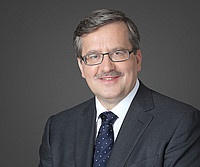 The need for economic growth, the demographic changes, and the preparation for entering into the eurozone are the top three priorities for Poland in the next four years according to President Bronislaw Komorowski. The head of State gave a speech at the new Parliament lower house Sejm’s inaugural meeting.
The need for economic growth, the demographic changes, and the preparation for entering into the eurozone are the top three priorities for Poland in the next four years according to President Bronislaw Komorowski. The head of State gave a speech at the new Parliament lower house Sejm’s inaugural meeting.
The first challenge is to “improve state’s functioning,” Komorowski said, underlining that in times difficult for Europe “only courageous and wise actions will allow Poland to continue stable economic growth.”
Poland must pay attention to growing life expectancy, and low total fertility rate. “The forecasts give a reason to worry and require a deep analysis,” he highlighted. The necessary steps should include “public debate about gradual increase of retirement age” to assure decent pension benefits, “support for responsible parenting” and completing the healthcare system reform.
The third challenge is the crisis in Europe. Poland should “reach the readiness to adhere to the eurozone,” Komorowski said. “It is about awareness that this is the way leading to further development.” Clearly the condition is to contain the current crisis,” the President observed. “Without membership Poland will be deprived of a chance to play a role in the world, adequate to our aspirations.”
Poland and its future in the eurozone.
2 Nov 2011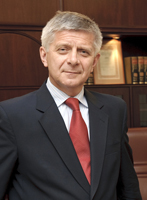 The prospect of Polish adoption of the euro became “clearer” after last summit of European leaders in Brussels. Polish central bank Governor Marek Belka is sure of it “even if we don’t want to name an entry date immediately.” The euro-area is moving toward closer political union, and Poland will “one day enter a new, different eurozone that carries the traits of a federation more than it does today,” said the Governor.
The prospect of Polish adoption of the euro became “clearer” after last summit of European leaders in Brussels. Polish central bank Governor Marek Belka is sure of it “even if we don’t want to name an entry date immediately.” The euro-area is moving toward closer political union, and Poland will “one day enter a new, different eurozone that carries the traits of a federation more than it does today,” said the Governor.
But a new poll finds that opinion continues to turn against adopting the single European currency. Fifty three percent of respondents told the OBOP pollsters that accession to the eurozone will be unfavourable for Poland.
Sixty five percent think that adopting the euro will have a negative impact on their household and 49 percent said they thought the single currency would have a negative effect on the economy. Only 22 percent thought the euro would be positive for the economy, 11 percent that it would have no effect and 18 percent answered “don’t know”. In 2007 the government said that they aimed to join the eurozone by 2012, but the finance crisis and debt levels forced to delay the plans.
Full Interview – Der Spiegel –
Welcome
We are a group of long experienced European journalists and intellectuals interested in international politics and culture. We would like to exchange our opinion on new Europe and Russia.
Categories
- Breaking News (11)
- CIS (129)
- Climate (2)
- Energy&Economy (115)
- EU Eastern Dimension (85)
- Euro 2012 – Sochi 2014 – World Cup 2018, Sport (43)
- Euro-Integration (135)
- History Culture (198)
- International Policy (261)
- Military (74)
- Interviews (18)
- Italy – Italia – Suisse (47)
- Odd Enough (10)
- Poland and Baltic States (126)
- Religion (31)
- Russia (421)
- Survey (4)
- Turning points (4)
- Ukraine (176)
- Российские страницы (113)
Archives
- November 2020
- October 2020
- September 2020
- August 2020
- July 2020
- May 2020
- April 2020
- March 2020
- January 2020
- December 2019
- November 2019
- October 2019
- September 2019
- August 2019
- July 2019
- June 2019
- May 2019
- April 2019
- March 2019
- February 2019
- December 2018
- November 2018
- October 2018
- September 2018
- August 2018
- July 2018
- June 2018
- May 2018
- April 2018
- March 2018
- February 2018
- January 2018
- December 2017
- November 2017
- October 2017
- September 2017
- August 2017
- July 2017
- May 2017
- March 2017
- January 2017
- December 2016
- November 2016
- October 2016
- September 2016
- July 2016
- June 2016
- May 2016
- April 2016
- February 2016
- January 2016
- November 2015
- October 2015
- September 2015
- June 2015
- April 2015
- March 2015
- February 2015
- January 2015
- December 2014
- November 2014
- October 2014
- September 2014
- August 2014
- July 2014
- June 2014
- May 2014
- April 2014
- March 2014
- February 2014
- January 2014
- December 2013
- November 2013
- October 2013
- September 2013
- August 2013
- July 2013
- June 2013
- May 2013
- April 2013
- March 2013
- February 2013
- January 2013
- December 2012
- November 2012
- October 2012
- September 2012
- August 2012
- July 2012
- June 2012
- May 2012
- April 2012
- March 2012
- February 2012
- January 2012
- December 2011
- November 2011
- October 2011
- September 2011
- August 2011
- July 2011
- June 2011
- May 2011
- April 2011
- March 2011
- February 2011
- January 2011
- December 2010
- November 2010
- October 2010
- September 2010
- August 2010
- July 2010
- June 2010
- May 2010
- April 2010
- March 2010
- February 2010
- January 2010
- December 2009
- November 2009
- October 2009
- September 2009
- August 2009
Our books




